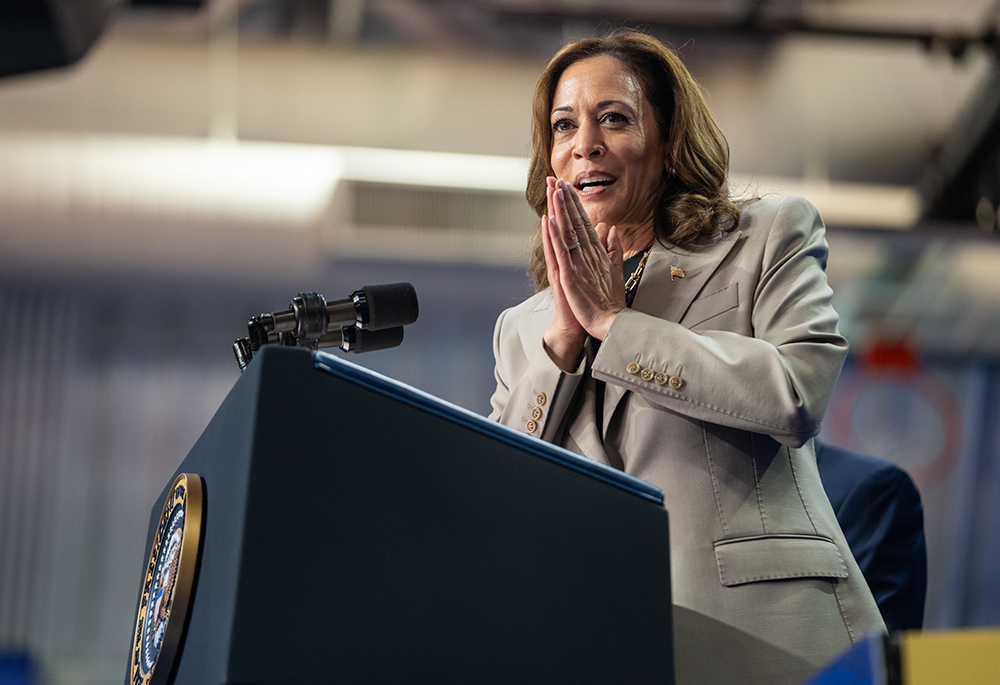
Vice President Kamala Harris delivers remarks with President Joe Biden on the administration's efforts to lower prescription drug costs for Americans on Aug. 15 in Largo, Maryland. (Official White House Photo/Lawrence Jackson)
Vice President Kamala Harris delivered a speech at the Economic Club in Pittsburgh, Pennsylvania, laying out her economic plans. Seen through the lens of Catholic social teaching, the speech earned a B-, but Harris isn't running to be prefect of the Dicastery for Integral Human Development. On the political merits, the speech earned an A-.
Harris began by defending the economic achievements of the Biden administration, and then pivoted to the present, saying the "cost of living in America is still just too high." She then broadened her criticism of economic policy: "Over the past several decades, our economy has grown better and better for those at the very top and increasingly difficult for those trying to attain, build and hold on to a middle-class life."
Harris might have strengthened the attention the speech received, and appealed to moderate voters, by acknowledging the degree to which Democrats were complicit in the reign of neoliberalism and its market orthodoxy. And she needs to create a better narrative about the economy the Biden administration inherited, the effects of the pandemic, maybe even admit the economic difficulties were not entirely the fault of former President Donald Trump. That might mean nothing to his supporters, but undecided voters might appreciate the contrast with his often vulgar characterizations of Harris. Displaying gratuitous generosity in assigning blame for the economic fallout from the pandemic, something President Joe Biden never does, would also shore up the credibility of Harris' claim that she wants to unite the country.
The vice president and her speech writing team have improved the way they speak about work and workers, which is critical when campaigning in industrial states like Michigan, Pennsylvania and Wisconsin. "For Donald Trump, our economy works best if it works for those who own the big skyscrapers, not those who actually build them, not those who wire them, not those who mop the floor." The phrase "those who wire them," combined with her praise for the International Brotherhood of Electrical Workers later in the speech, shows growth in Harris' understanding of, and speaking to, the lives of blue-collar workers.
Most importantly, in this section of the speech dedicated to growing the middle class, Harris laid down a common good marker that would have been laughed out of the room in the heady days of Reaganism and Clintonism. She said we need to "make sure our economy works for everyone." Market economies require competition, but it doesn't have to be a competition to the death. From television shows like "Lifestyles of the Rich and Famous" to movies like "The Wolf of Wall Street," the celebration of selfishness in American economic life paved the way for the depredations of Trumpism. Harris stated she was a capitalist, but a capitalist bound by values of "fairness, dignity and opportunity." Harris understands, and is getting better at communicating, the core Catholic teaching about economics: The economy is made for man, not man for the economy (cf. Mark 2:27-28).
Harris then invoked Franklin Roosevelt's promise of "bold, persistent experimentation" and my heart warmed to the reference. She strongly advocated pragmatism in government economic interventions, which should take the sting out of Trump's efforts to paint her as a radical. "I believe we shouldn't be constrained by ideology and instead should seek practical solutions to problems," she added. She expressed a willingness to take "good ideas from wherever they come." And she went on to propose very specific pro-family policies such as increasing child and family leave, and subsidizing elder care. One of the most moving parts of the speech was when Harris described caring for her mother.
Advertisement
Another proposal represented a turning the page on Clintonian meritocratic ideas: Harris called for eliminating degree requirements for apprenticeship programs. It is time to "emphasize skills and not just degrees," she said. One can hope that this is the first of many steps that will eventually lead Harris and the Democratic Party to recognize that student loan forgiveness must be yoked with something for those who don't go to college, such as startup money for a new business. And both loan forgiveness and startup money should be linked to national service.
From the standpoint of Catholic social teaching, the biggest problem with the speech was what it did not include. There was no focus on poverty. Could it be that the political efficacy of leading the fight against poverty died in 1968, entombed with Dr. King and Bobby Kennedy? Some of Harris' proposals will have anti-poverty effects. Increasing the child tax credit goes a long way toward lowering the rate of childhood poverty as the Center on Budget and Policy Priorities has shown. But it is a measure of how far the American social imagination is from Catholic social teaching that a Democratic presidential candidate does not lead with fighting poverty.
Biden has achieved a great deal legislatively that pulled our economy away from neoliberal ideas and toward ideas shared by Catholic social teaching. Sadly, he lacked the rhetorical ability to create a narrative to explain the purpose and value of his achievements. Former Presidents Barack Obama and Bill Clinton had the rhetorical skills but shied away from ditching neoliberal policies.
Harris' oratorical style is better than Biden's even if it doesn't match Obama's or Clinton's. Her policies far outstrip theirs, however, and build on Biden's solid policy achievements. Harris lands in the middle, which might be just good enough to win in November and, more importantly, to continue the policy and political shift away from neoliberalism and toward a more human economy centered, as she said, on fairness, dignity and opportunity.







